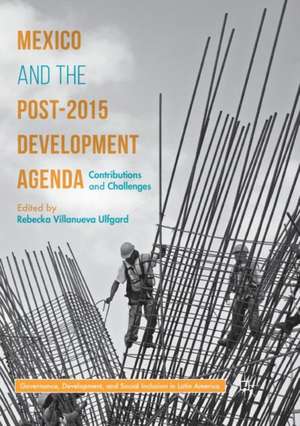Mexico and the Post-2015 Development Agenda: Contributions and Challenges: Governance, Development, and Social Inclusion in Latin America
Editat de Rebecka Villanueva Ulfgarden Limba Engleză Paperback – 20 sep 2018
This book explores how and why Mexico’s approach to the 2030 Agenda for Sustainable Development and Sustainable Development Goals (SDG) implementation with the López Obrador administration is unsustainable and non-transformative, overshadowed by his vision of Mexico’s “Fourth Transformation”. Approached as a super mantra revolving around “Republican Austerity” and “First, the poor”, it provides original analysis of structural and conjunctural challenges facing Mexico as regards People-, Planet-, and Peace-centered development. The book reveals the promise “First, the poor” is inconsistent with data on Mexico’s poverty reduction (SDG1). Despite record-high spending on social programs and unmatched coverage, the recent tendency of improvement in tackling poverty is rather ambiguous from the perspective of multidimensional poverty. The book covers access to clean energy (SDG7), resilient infrastructure and sustainable industrialization (SDG9), and safeguarding biodiversity(SDG15) by examining three megaproject case studies: the oil refinery Dos Bocas, the Interoceanic Corridor of the Isthmus of Tehuantepec, and the Maya Train, generating concern with the economic, environmental, and social dimensions of sustainable development. The prospects for an ‘enabling environment’ for SDG implementation are hampered by persistently high levels of homicides and impunity (SDG16). Turning Mexico’s Armed Forces into ‘first development partner of choice’ is problematized as regards their reach in infrastructure megaprojects and social welfare programs, in the overall context of the ‘de-risking state’ favoring private capital. The result, as determined by Villanueva Ulfgard, has led Mexico further astray from sustainable and transformative development.
| Toate formatele și edițiile | Preț | Express |
|---|---|---|
| Paperback (1) | 637.93 lei 6-8 săpt. | |
| Palgrave Macmillan US – 20 sep 2018 | 637.93 lei 6-8 săpt. | |
| Hardback (1) | 643.34 lei 6-8 săpt. | |
| Palgrave Macmillan US – 5 mar 2017 | 643.34 lei 6-8 săpt. |
Preț: 637.93 lei
Preț vechi: 750.50 lei
-15% Nou
Puncte Express: 957
Preț estimativ în valută:
122.08€ • 132.56$ • 102.55£
122.08€ • 132.56$ • 102.55£
Carte tipărită la comandă
Livrare economică 22 aprilie-06 mai
Preluare comenzi: 021 569.72.76
Specificații
ISBN-13: 9781349955022
ISBN-10: 1349955027
Pagini: 274
Ilustrații: XV, 274 p. 16 illus.
Dimensiuni: 148 x 210 mm
Greutate: 0.35 kg
Ediția:Softcover reprint of the original 1st ed. 2017
Editura: Palgrave Macmillan US
Colecția Palgrave Macmillan
Seria Governance, Development, and Social Inclusion in Latin America
Locul publicării:New York, United States
ISBN-10: 1349955027
Pagini: 274
Ilustrații: XV, 274 p. 16 illus.
Dimensiuni: 148 x 210 mm
Greutate: 0.35 kg
Ediția:Softcover reprint of the original 1st ed. 2017
Editura: Palgrave Macmillan US
Colecția Palgrave Macmillan
Seria Governance, Development, and Social Inclusion in Latin America
Locul publicării:New York, United States
Cuprins
Introduction .- Mexico from the Millennium Development Goals to the Sustainable Development Goals: Congruence and dissonance in development compromises .- From MDGs to SDGs: A Transformative 2030 Agenda for Sustainable Development .- Mexico’s Contributions to Framing the 2030 Agenda for Sustainable Development .- Inclusive Participation in Global Development Governance:Contributions from Mexico’s foreign policy .- The Image of Mexico Abroad in the Context of the Millennium Development Goals: Lessons for Public Diplomacy .- Insecurity in Mexico and the 2030 Development Agenda .- Sustainable Development Goals on Poverty and Inequality and their Relationship to Social Policy in Mexico .- Migration and the Development Agenda Beyond 2015: A view from Mexico .- Environmental Sustainability in the 2030 Agenda: Is Mexico up to the task? .- Indigenous Peoples and Mexico’s Contributions to the 2030 Agenda .- Resistance by Indigenous Peoples to the Wind Park on the Isthmus of Tehuantepec in Oaxaca.
Recenzii
Notă biografică
Rebecka Villanueva Ulfgard is Associate Professor in International Studies at the Instituto Mora, Mexico City. She is an expert on Mexico and international development cooperation, Mexico’s civil society and New Multilateralism, and theories of international relations and development. She is the lead coordinator of the book series Governance, Development, and Social Inclusion in Latin America (Palgrave Macmillan).
Textul de pe ultima copertă
This interdisciplinary edited collection presents original analysis on Mexico’s transition from the Millennium to the Sustainable Development Goals, departing from three main perspectives. In what areas did Mexico gain leverage and actually contribute to the debate around the proposed SDGs? What are the challenges for Mexico with regard to the SDGs? How to handle the issue of congruence/dissonance in Mexico’s accomplishment of the MDGs in relation to the socioeconomic realities on the ground? The contributing authors examine what kind of state is needed to strengthen democratic politics and social justice, but also to improve the economic effectiveness of the state and thereby prospects for development. For Mexico, what is missing is a clear vision for creating a progressive, truly modern society where the notion of a social contract between the government and citizens could be established along the lines of a welfare state that is inclusive, sustainable, and transformative enough to tackle seriously the fundamental socioeconomic injustices dividing Mexicans.
Caracteristici
Applies critical approaches to the 2030 Agenda for Sustainable Development and the Sustainable Development Goals Reveals how the López Obrador administration understands development from the vision of Mexico’s “Fourth Transformation” Considers structural and conjunctural challenges facing Mexico vis-à-vis People-, Planet- and Peace-centred development Investigates why “Republican Austerity”, militarization and the ‘de-risking state’ produce unsustainable development















